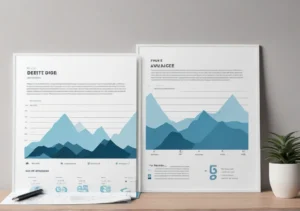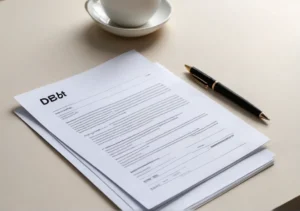
Paying off debt before retirement isn’t just a financial goal; it’s essential for a stress-free retirement. As you approach your golden years, every dollar counts, and debt can cast a shadow over your plans for freedom and leisure.
To pay off debt before retirement, prioritize and create a structured payment plan that fits your budget, while also considering strategies like the snowball or avalanche methods for tackling debt effectively. But that’s just a starting point—discover smart strategies and insights that can make your journey to becoming debt-free more achievable as you scroll down.
Key Takeaways:
- Assess your debts by gathering balances, interest rates, and minimum payments to prioritize effectively.
- Focus on high-interest debts first and consider strategies like the snowball or avalanche methods for repayment.
- Increase your income through side jobs or freelance work while adjusting your lifestyle to cut unnecessary expenses.
Disclaimer: The information on this blog is for general educational purposes only and does not constitute personalized financial advice. While we strive for accuracy, FinanceBeacon cannot guarantee the reliability or suitability of the content for your specific financial decisions. Always consult a qualified financial advisor before making any financial choices. Use this information at your own risk.
Assess Your Current Debt Situation
Getting a grip on your current debt situation is the first step toward financial freedom. Take a deep breath and start gathering all relevant information. List every debt you have, from credit cards to personal loans, including the total balances, interest rates, and minimum monthly payments. This will help you understand where you stand.
Consider the method that works best for you—whether it’s a simple Excel spreadsheet, a budgeting app, or even good old-fashioned pen and paper. Once you’ve compiled your list, calculate the total amount you owe. This number can feel daunting, but knowledge is power.
Next, categorize your debts. Break them down into high-interest vs. low-interest and secured vs. unsecured. For instance, credit cards usually have higher interest rates, while mortgages may be lower and secured against your property. This categorization will guide your strategy on which debts to tackle first.
Additional Insight : Don’t overlook annual fees or any hidden costs that come with your debts. Sometimes, lenders will tack on charges that can add up fast. Make sure to include those in your overall assessment.
Create a Budget
Now that you’ve outlined your debts, it’s time to roll up your sleeves and create a budget that prioritizes paying them off. First, list your monthly income and fixed expenses—think rent, utilities, and groceries. This gives you a clear picture of what you have coming in versus what’s going out.
Next, allocate a portion of your income specifically for debt repayment. A common approach is the 50/30/20 rule, which suggests you spend 50% on needs, 30% on wants, and 20% on savings and debt. However, you might want to adjust this, directing a larger share toward your debts, especially if retirement is on the horizon.
Create specific line items for each debt repayment. For instance, if you’ve got a credit card with a high balance, allocate an extra payment toward that to help reduce the principal faster. Tracking your progress can be motivating, so check off each debt as you pay it down. It might also help to set milestones—maybe a dinner out for every debt you eliminate completely.
Finally, don’t forget to revisit your budget regularly. Life changes, expenses fluctuate, and you may find areas to cut back to focus even more on getting rid of that debt before retirement. Keeping it flexible ensures you stay on track while also being realistic about your lifestyle.
Prioritize High-Interest Debt
Paying off high-interest debt should be your top priority, especially if you’re eyeing a debt-free retirement. Start by listing all your debts along with their interest rates. Focus on the ones with the highest rates first, like credit card debt or personal loans. Why? They cost you way more over time due to interest compounding daily.
Consider refinancing options for high-interest debts if your credit score allows it. This can lower your overall interest rate and reduce your monthly payments, freeing up cash to tackle the principal faster. Another handy tip is to allocate any extra cash you find—like tax refunds or bonuses—directly to this debt. It’s amazing how quickly things can improve when you push extra funds toward your most expensive liabilities.
Use Debt Repayment Strategies
Debt repayment doesn’t have to feel overwhelming. Two popular methods to consider are the snowball and avalanche approaches.
With the snowball method, list your debts from smallest to largest. Pay the minimum on all but the smallest debt; prioritize those monthly payments. Once that initial debt is paid off, take the money you were using for that, plus any additional funds, and redirect them to the next smallest debt. This builds momentum and keeps you motivated.
In contrast, the avalanche method requires focusing on the highest-interest debts first, as discussed earlier. This method generally saves you more money over time since you’re reducing the principal balance on debt that’s costing you the most.
Combine your strategy with a budget to track your spending and set aside funds for debt repayment. Don’t forget to monitor your progress regularly; little victories go a long way in keeping your spirits high and your wallet healthier. Also, consider creating a debt repayment plan with specific, measurable goals—like paying off a particular debt within six months. Tracking your wins can keep the positive momentum rolling as you inch closer to financial freedom before retirement.
Consider Consolidation Options
Debt can feel overwhelming, especially as you approach retirement. Consolidating your debts can relieve some of that pressure. Debt consolidation loans or balance transfer cards can simplify your payments. Instead of juggling multiple bills with varying interest rates, you roll everything into one manageable sum.
Look for loans with lower interest rates than what you’re currently paying. This can significantly reduce the overall amount you pay and help you pay off the principal faster. Aim for loans with a fixed interest rate to avoid surprises down the line.
Additionally, if you choose a balance transfer offer, check for any introductory rates—these can give you a break from paying interest for several months. Just be mindful of any fees associated with transferring balances. Creating a timeline to fully pay off the transferred balance before the interest rates skyrocket is key.
Lastly, don’t shy away from local credit unions; they often provide competitive rates and personalized service. Remember, each situation is different, so weigh your options carefully before you commit.
Increase Your Income
Boosting your income can tremendously speed up your debt repayment. If you’re eyeing additional work, think outside the nine-to-five box. Freelancing or part-time gigs can fit seamlessly into your lifestyle, allowing you to direct that cash towards your debt.
- Explore gig economy apps like Uber, DoorDash, or TaskRabbit. They offer flexible schedules and can quickly add to your income.
- Online platforms are another gold mine. Websites like Upwork or Fiverr enable you to showcase your skills—be it writing, graphic design, or even virtual assisting.
- Consider teaching or tutoring in your area of expertise, whether it’s math, music, or languages. Your knowledge can be turned into a profitable side hustle.
A unique angle? Evaluate your current hobbies. Can you monetize your passion for craft-making or photography? Platforms like Etsy or social media can help turn your hobbies into cash cows.
Taking these steps toward increasing your income might feel daunting, but each small win will empower you to tackle that debt—and keep you on track for a financially secure retirement.
Adjust Your Lifestyle
Cutting back on your spending doesn’t mean living like a hermit. It’s about prioritizing and making small changes that can snowball into bigger savings. Start by identifying unnecessary subscriptions—streaming services, gym memberships, or that magazine you rarely read. Cancel a few and watch the savings grow.
Next, get competitive on things like groceries. Make a list before shopping and stick to it; you might even try online grocery shopping to resist impulse buys. Consider meal prepping for the week to avoid grabbing takeout on busy nights. Swap dining out for cozy dinner parties at home; it’s often cheaper and way more personal.
Look closely at your utilities too. Small tweaks like unplugging devices when they’re not in use or using energy-efficient bulbs can make a difference. If you’re feeling ambitious, consider reducing your housing expenses. Maybe it’s time to downsize or rent out a room. It’s all about finding that balance to free up extra cash for your debt payments.
One effective strategy is to set a challenge for yourself. Try a 30-day no-spending challenge; it’s a great way to identify spending triggers and develop more mindful habits.
Explore Financial Counseling
Getting a fresh perspective can be a game-changer. Financial counselors can offer tailored advice that fits your specific situation, helping you to tackle debt efficiently. Look for someone accredited by reputable organizations like the National Foundation for Credit Counseling (NFCC) or the Financial Planning Association (FPA).
During your consultation, be open about your financial situation, including income, expenses, and debts. This honesty allows counselors to craft a personalized plan. They might suggest debt consolidation if you have multiple loans, which can lower interest rates and simplify your payments.
Some counselors also provide budgeting tools to help you stay on track. They can assist in setting clear, realistic financial goals and help you stay accountable. If your debt feels overwhelming, they might even offer resources on debt management programs that can negotiate with creditors on your behalf.
Don’t overlook the power of group counseling sessions. They can provide not just knowledge but a supportive community to lean on during your journey. Remember, asking for help shows strength and a commitment to your financial future.
As a financial advisor, my goal is to guide you through the world of personal finance with clear, practical advice. With a dedication to clarity and your financial well-being, I’m here to provide insightful guidance and support as you build a foundation of wealth and security.







